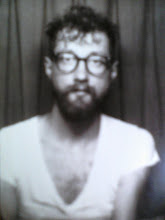
Staggering around doing the best we can.
Xmas came in like a lonesome coma. I languished in the resulting miasma most of the day. Out of bed, sure, but joined at the hip with a bottle of red wine and no bath; one doesn't really leave bed like this.
Back to Herzog for me. I opted to look into one of his earlier films, The Land of Silence and Darkness from 1971. He presents a number of German citizens who are all in various stages of being struck both blind and deaf. Some went deaf and then blind later in life, one after the other. Some were born into deafness to be followed by the loss of sight or vice versa. We follow a woman whom had taken a violent spill down some stairs as a child. The blow swiftly robbed her of sight and secluded her to her bed. Without warning her hearing began quickly to sputter and fail as well.
She communicates using a system developed over time via the palm of the hand. It's known as the tactile alphabet. Throughout the film she steadfastly displays a will of iron and unending energy. She slowly but emphatically employs the tactile alphabet in greeting old friends and new acquaintances alike.
Herzog shows us how each of these various people deals with the truncated sense of the world in which they find themselves. It ranges savagely from devout hope and will to lost animalistic ruin. A lot of that outcome, it seems, is a result of how loved ones and civilization in general reacted to the needs of the deaf-blind. If there was despair on the part of the disabled coupled with an unwillingness or inability of others to develop tactile communication and, therefore, stimulation then many of the deaf-blind in the cases presented became arrested in a solitary world perhaps fairly likened to autism. Locked away and drifting ever further beyond reach.
And as for those born under the veil of these two missing faculties it seems hopeless altogether. One woman training two young boys on the tactile alphabet admits severe limitations in her progress. A basic grasp of tactile communication doesn't necessarily mean that any abstract concepts are developed or understood. Communicating such ideas, it seems, is futile.
One of these boys lingers in Herzog's lens for prolonged periods. His movements and behavior are nearly indiscernible from what one could only liken to mental retardation. But nothing beyond the basic input of sight and sought is physiologically wrong with his brain. It's atrophy in regular development is the result of an impossible roadblock that forces his will into scattered offshoots. It is a state of being into which we have no insight.
What haunts me is the fragility of human powers of comprehension. Take away two of our main sensory inputs and I fear it is a very slippery slope to becoming a mindless animal.
One man was born blind. Up the age of 35 he retained his hearing, but that failed too. He had learned braille, but, astoundingly, that concept atrophied. He drifted out into the deep recesses of his mind and sought out the company of animals. He slept in a stable for years. His mother continued to care for him through all of this, but she fell short of seeking out proper care to ensure a line of communication should remain intact between the outside world and her son.

In some of the final shots of the film this middle aged man is introduced to the woman Herzog has focused on throughout. Communication is attempted, but fails of course. The man's polite reserved actions look like a faraway parody of social grace, a shadow of learned behavior. He rises from the benches where his mother (dressed like a widow and hidden behind large sunglasses) sits with the central woman and her guide.
As they chatter away about his state he wanders aimlessly behind in the grass. Completely on his own.

Herzog has something of a tendency to get surprisingly emotional in some of his earlier work. At least, in this film in particular.
Jackson Wyeth Davis III
I couldn't muster much interest in The Ecstasy of The Sculptor Stiener. Admittedly, I didn't know anything going into it, and it turns out to be a film about a ski flyer. Beautiful footage of jumps, but Swiss athlete Stiener isn't terribly interesting to me. I thought he was literally going to be a sculptor. I was a lot more interested in the workshop were he carved his overweight skis. Planks of wood. Multitude of chisels all hanging neatly overhead. Good stuff.
I like workshops. I always need one. Growing up wandering around my pop's workshop was invaluable. He kept everything. Now I do, too. Our ideas of usefulness are vastly different. He was set up for years in the first floor of an old renovated barn about fifty yards from our house in Pennsylvania. He was therefore my Jackson Pollack and my Andrew Wyeth. One whom I loathe and one whom I love. Don't worry, Dad. I love all of you.


